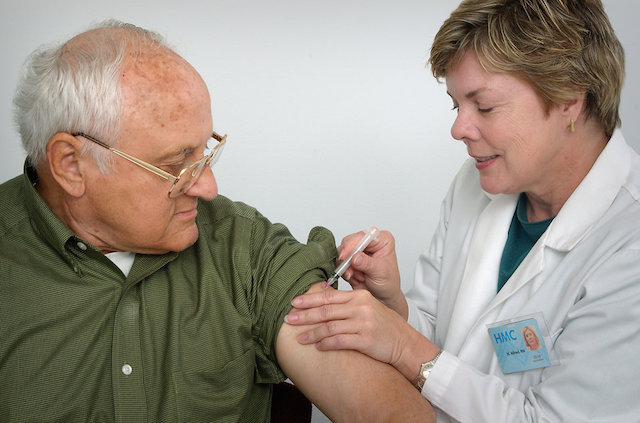
Older people who received the vaccine for shingles had a 20% lower risk of dementia, according to researchers who called the results “remarkable”.
The study looked into the health records of seniors in Wales and revealed that those who received the shingles vaccine were 20% less likely to develop dementia over the next seven years than those who didn’t receive the jab.
Scientists say the findings support an emerging theory that viruses which affect the nervous system can increase the risk of dementia.
The new findings suggest that a preventive intervention for dementia is already close at hand.
Shingles is a viral infection that produces a painful rash, and is caused by the same virus that causes chicken pox, varicella-zoster. After people contract chicken pox, usually in childhood, the virus remains dormant in the nerve cells for life. In people who are older or have weakened immune systems, the dormant virus can reactivate and cause shingles.
Previous studies based on health records have linked the shingles vaccine with lower dementia rates, but the research could not account for one major source of bias: people who are vaccinated also tend to be more health conscious.
The study’s senior author, Dr. Pascal Geldsetzer of Stanford Medicine, said that most studies suffered from the basic problem. “In general, they’re seen as not being solid enough evidence to make any recommendations on.”
But two years ago, Dr. Geldsetzer recognized a fortuitous “natural experiment” in the rollout of the shingles vaccine in Wales that seemed to sidestep the bias.
The vaccination program, which began in September 2013, specified that anyone who was 79 was eligible for the vaccine for one year. That age rule, designed to ration the limited supply of the vaccine, also meant that the slight difference in age between 79 and 80 made all the difference in who had access to the vaccine.
By comparing people who turned 80 just before the roll-out with those who turned 80 just after, the circumstances were about as close to a randomized controlled trial as possible, without actually conducting one—and the results are all well-documented in the country’s health records.
(Watch a Stanford video about the study, or continue reading below…)
The Stanford team analyzed details of more than 280,000 adults who did not have dementia at the start of the vaccination program. They focused their analysis on those closest to either side of the eligibility threshold – comparing people who turned 80 in the week before with those who turned 80 in the week after.
RELATED STUDY: Recreational Cannabis Use Linked to Lower Risk of Cognitive Decline and Dementia-Related Diseases
“We know that if you take a thousand people at random born in one week and a thousand people at random born a week later, there shouldn’t be anything different about them on average,” explained Geldsetzer.
“What makes the study so powerful is that it’s essentially like a randomized trial with a control group – those a little bit too old to be eligible for the vaccine – and an intervention group, those just young enough to be eligible.”
Fast-forward seven years and by 2020, one in eight of the Welsh seniors had been diagnosed with dementia.
But those who received the shingles vaccine were 20% less likely to have developed dementia than those who were unvaccinated.
POSSIBLE BREAKTHROUGH: Scientists Discover a Potential Way to Repair Synapses Damaged in Alzheimer’s Disease
“It was a really striking finding,” said Geldsetzer. “This huge protective signal was there, any which way you looked at the data.”
The scientists looked for other variables that might have influenced dementia risk, but found none.
“Because of the unique way in which the vaccine was rolled out, bias in the analysis is much less likely than would usually be the case. The signal in our data was so strong, so clear and so persistent.”
The study, published in the journal Nature, also showed that protection against dementia was much more pronounced in women than in men.
Geldsetzer believes that could be because women, on average, have higher antibody responses to vaccination, and because shingles is more common in women than in men.
GOOD ADVICE: Popping a Daily Multivitamin Could Prevent Cognitive Decline as we Age, Shows Third Study
In the past two years, his team has replicated the Wales findings in health records from other countries, including England, Australia, New Zealand and Canada, that had similar rollouts of the vaccine.
“We just keep seeing this strong protective signal for dementia in dataset after dataset,” insisted Geldsetzer.
He is seeking funding for a larger trial, which would provide even stronger proof of cause and effect, noting that the live-attenuated vaccine used at that time contained a weakened form of the virus, which is no longer manufactured by pharmaceutical companies.
“It would be a very simple, pragmatic trial because we have a one-off intervention that we know is safe.”
KNOW A SENIOR WHO NEVER GOT THEIR SHINGLES SHOT? Share This On Social Media!



















